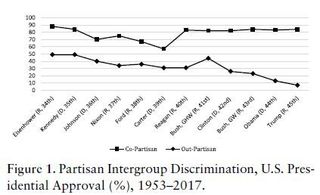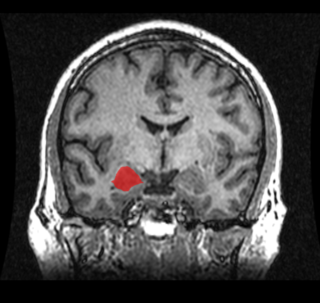Neuroscience
How Politicians' Statements Register in the Partisan Brain
Research shows how policy statements register with political partisans.
Posted February 11, 2018
Knee-jerk partisanship is running amok these days. It seems that no matter what a Democratic politician says many Republicans reflexively disagree. And ditto for Democrats’ reflexes. Examples?
Republicans loved states’ rights when some states didn’t want Obamacare, and Democrats opposed states’ rights for the same reason (opposition to Obamacare).
Democrats loved states’ rights when some states wanted to allow sanctuary cities, and Republicans opposed states’ rights for the same reason (opposition to sanctuary cities).
And remember this figure from a previous post showing that we love the president when he’s from our party, but we’re less than enthusiastic when he’s from the other one?

So, it’s nice to see that the things politicians say about policies do register in the brains of political partisans. Researchers Ingrid Haas, Melissa Baker, and Frank Gonzalez scanned the brains of 58 adults (32 political liberals and 26 political conservatives) using fMRI while they presented the subjects with several dozen policy positions taken by two hypothetical Democratic and two hypothetical Republican candidates.
They were interested in looking at neural activation in the areas of the brain dealing with attitudes and evaluative processing of information, in particular, the amygdala, insular cortex, and anterior cingulate cortex (ACC).

The policy positions were either congruent with the policy positions taken by a typical candidate of that party (e.g., a Democratic candidate who definitely supports “government regulation of business” or a Republican candidate who definitely supports “increasing defense spending”) or incongruent (e.g., a Democratic candidate who definitely opposes “the right to have an abortion” or a Republican candidate who definitely opposes “the death penalty”).
THEY FOUND...

Analyses of the fMRI data showed the policy-candidate stimuli generated significant neural activation in all of the areas of interest of their respondents’ brains. They found in particular that the incongruent stimuli activated all three regions of interest: the dorsal ACC and paracingulate, the insula and lateral orbitofrontal cortex, and the right amygdala.
And subject-candidate ingroup (e.g., a liberal subject evaluating a Democratic candidate) and outgroup (e.g., a liberal subject evaluating a Republican candidate) status matters.*
They found that more liberal subjects showed greater activation in the ACC and left insula to incongruent versus congruent policies for ingroup (Democratic) candidates, but more conservative subjects showed greater ACC and left insula activation to incongruent versus congruent policies for outgroup (Democratic) candidates.

SO WHAT?
These results suggest that Democrats may be more likely to scrutinize their party’s candidates than Republicans are to scrutinize their own candidates. They may also mean that despite suggestions Republicans are more rigid in their political positions than Democrats, Republicans may actually be more open to liberal policies than Democrats are to conservative policies.
And, most importantly to me at least, they may mean that while knees are jerking some brain neurons are firing, too.
*OK, don’t get crazy on me political science nerds. I know ideology and party ID are not the same, but these studies are tough enough to do, and this is reasonable here.
References
Haas, Ingrid Johnsen, Melissa N. Baker, and Frank J. Gonzalez. 2017. "Who can deviate from the party line? Political ideology moderates evaluation of incongruent policy positions in insula and anterior cingulate cortex." Social Justice Research 30(4): 355-380.


